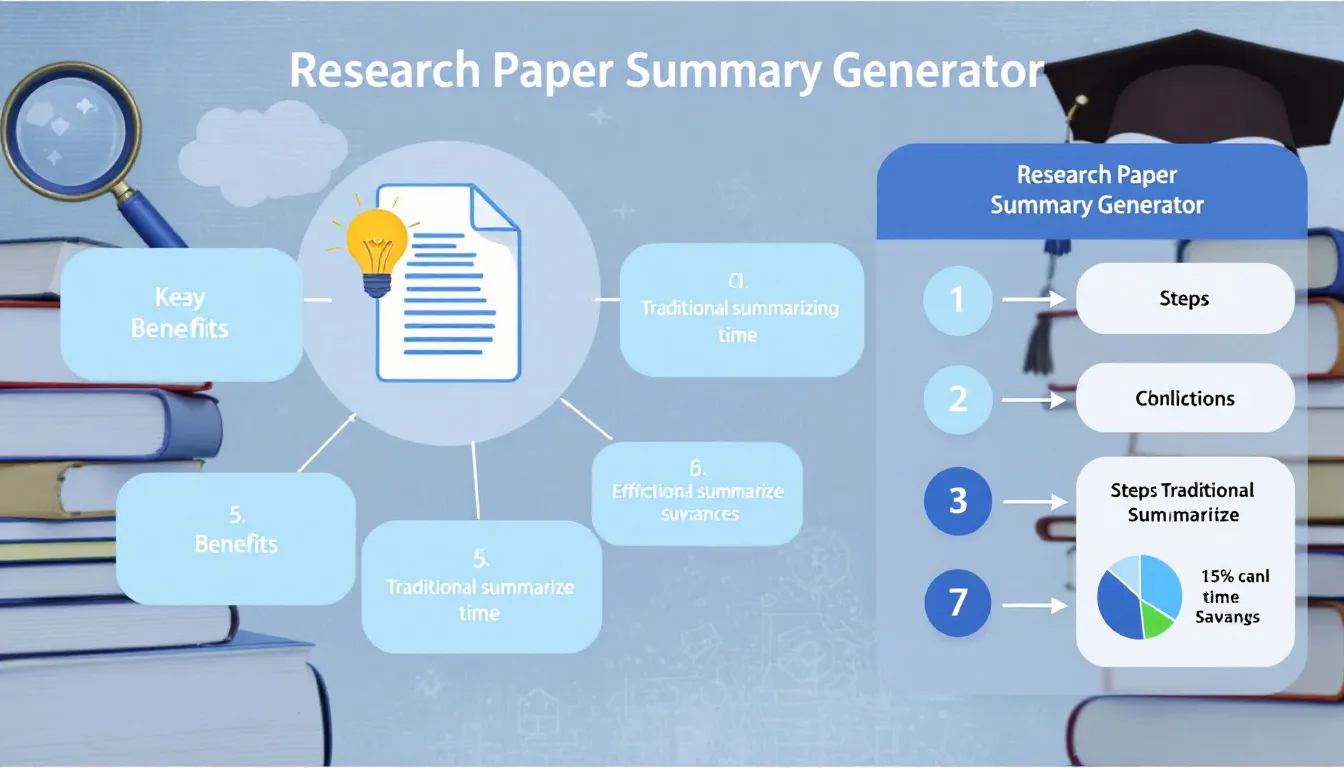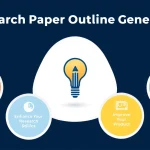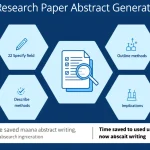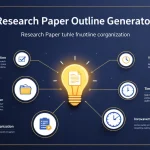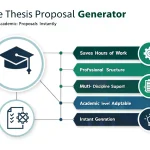Research Paper Summary Generator
Is this tool helpful?
How to Use the Research Paper Summary Generator Effectively
The Research Paper Summary Generator helps you create clear and concise summaries of detailed academic papers. Follow these steps to maximize your results:
-
Enter the Paper Title: Provide the full title of the research paper you want to summarize.
Example inputs:- “The Role of Nanotechnology in Renewable Energy Development”
- “Urban Air Pollution: Health Impacts and Mitigation Strategies”
-
Summarize Key Findings: Write a concise summary of the most important findings. Keep it clear and to the point.
Example inputs:- “Nanomaterials increased solar cell efficiency by 20%, reducing production costs.”
- “The study found a 30% rise in respiratory diseases linked to increasing urban air pollution levels.”
-
Describe the Research Methodology: Briefly explain how the researchers conducted the study.
Example inputs:- “Laboratory experiments using carbon nanotubes to test photovoltaic properties under different light conditions.”
- “Epidemiological survey across five metropolitan areas measuring pollution levels and health records over five years.”
-
Summarize Main Results: Highlight the primary outcomes of the research.
Example inputs:- “Solar cells with nanomaterial coatings showed a 20% increase in energy conversion efficiency.”
- “Data indicated a correlation coefficient of 0.65 between pollution levels and hospital admissions due to asthma.”
-
Explain the Implications: Describe what the results mean for the field or society.
Example inputs:- “Nanotechnology can lower renewable energy costs, accelerating adoption worldwide.”
- “Results highlight urgent need for pollution control policies to reduce urban health risks.”
-
Include Key Terms (Optional): List important terms or concepts from the paper.
Example inputs:- “Nanotechnology, Photovoltaics, Renewable Energy, Energy Efficiency”
- “Air Pollution, Respiratory Health, Epidemiology, Urban Environment”
-
Provide Background Context (Optional): Add relevant information to help explain the study’s significance.
Example inputs:- “This study expands on earlier work exploring nanomaterials for energy applications, offering real-world testing data.”
- “Serves as a follow-up to prior regional pollution studies, including more comprehensive health outcome data.”
After completing the required fields, click the “Generate Summary” button. The generator will process your input and produce a well-structured summary that captures the core details of your research paper.
Introduction to the Research Paper Summary Generator
The Research Paper Summary Generator is a web-based tool designed to help you quickly create clear, concise summaries of complex academic research papers. It distills essential information from your input—such as key findings, methodology, results, and implications—into an easy-to-understand format.
Purpose and Definition
The tool serves students, researchers, and professionals who need to comprehend and communicate research findings efficiently. By guiding you through structured input fields, it synthesizes your responses into a coherent research summary. This summarization supports better understanding, faster literature reviews, and improved academic communication.
Built around natural language processing and automated text generation techniques, the summary generator transforms your detailed information into polished summaries that are suitable for presentations, reports, or study notes.
Key Benefits of Using the Research Paper Summary Generator
- Save Time: Generate summaries in minutes instead of hours spent on reading and condensing research papers.
- Enhance Understanding: The structured summary format helps you grasp the main points quickly and clearly.
- Maintain Consistency: Ensure every summary covers all critical aspects of a paper for better comparison and review.
- Increase Accessibility: Simplify complex academic language to reach a broader audience beyond specialists.
- Boost Research Efficiency: Quickly generate summaries for numerous papers during literature reviews or meta-analyses.
- Support Academic Writing: Use generated summaries as foundations for literature reviews, citations, or presentations.
Practical Usage of the Research Paper Summary Generator
This tool acts as an intuitive form-based application where you input key details about a research paper. It does not perform calculations but processes your text to create a refined summary. Here’s how you can use it effectively in your research workflow:
Literature Review Preparation
When compiling a literature review, use the generator to summarize each paper quickly. This allows you to:
- Identify recurring themes and gaps in current research.
- Compare methodologies and findings across studies.
- Keep your notes organized with consistently formatted summaries.
Academic Writing and Presentations
Incorporate the generated summaries as well-structured references in your writing or presentations. This saves time and ensures accuracy when describing prior work or supporting arguments.
Cross-Disciplinary Collaboration
Use the tool to better understand papers outside your specialization. Clear summaries let you grasp core concepts quickly, facilitating effective collaboration and knowledge exchange across fields.
Improving Research Comprehension
The generator’s structured approach supports learning and retention by breaking down research papers into digestible parts. This makes it easier for students and early-career researchers to develop summarization skills.
Important Disclaimer
The calculations, results, and content provided by our tools are not guaranteed to be accurate, complete, or reliable. Users are responsible for verifying and interpreting the results. Our content and tools may contain errors, biases, or inconsistencies. Do not enter personal data, sensitive information, or personally identifiable information in our web forms or tools. Such data entry violates our terms of service and may result in unauthorized disclosure to third parties. We reserve the right to save inputs and outputs from our tools for the purposes of error debugging, bias identification, and performance improvement. External companies providing AI models used in our tools may also save and process data in accordance with their own policies. By using our tools, you consent to this data collection and processing. We reserve the right to limit the usage of our tools based on current usability factors.
